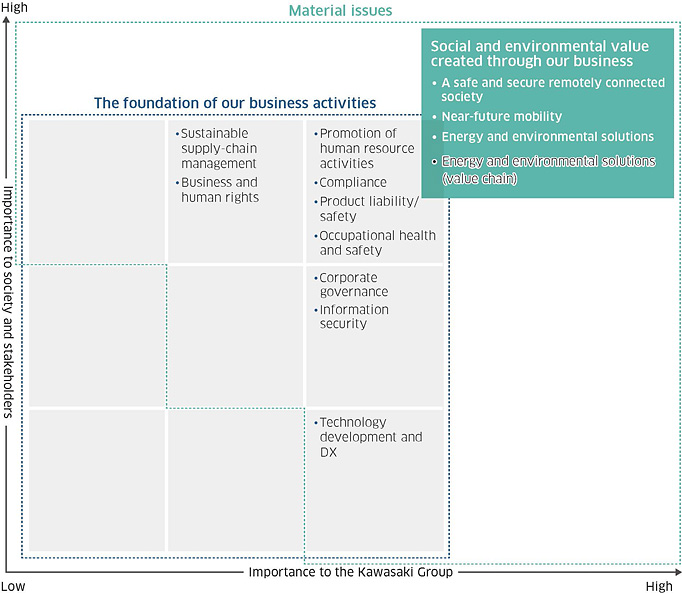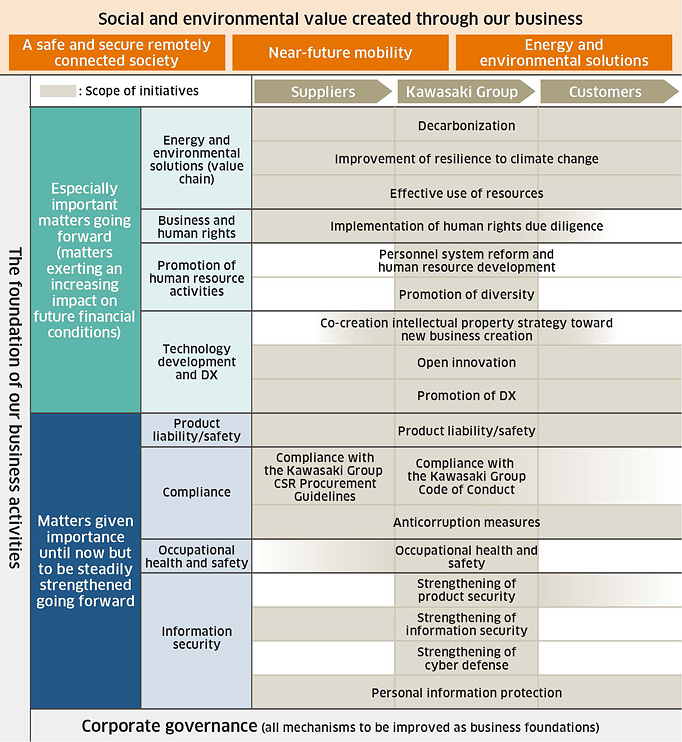Materiality
- Process for Identifying Material Issues within the Kawasaki Group
- Comments of Experts Interviewed in Step 3
- Materiality Matrix
- KPIs and Results for Materiality "The Foundation of Our Business Activities"
Process for Identifying Material Issues within the Kawasaki Group
The expectations and requirements of stakeholders are diversifying, and the business environment surrounding us
is changing. In consideration of these factors, the Kawasaki Group pinpointed and arranged the impact that our
Group’s business activities have on society and in 2018 identified the Kawasaki Group’s
materiality.
Following the announcement of our Group Vision 2030 in November 2020, we revised this materiality. As in 2018,
we divided materiality into the two broad categories of social and environmental value created through our
business and the foundation of our business activities. We defined 1) initiatives through our principal business
as the most important issues that our Group should challenge over the long term and also positioned other 2)
issues as fundamental matters to be addressed toward the solution of materiality. Going forward, we will
continue to regularly revise our material issues in accordance with changes in the business environment and
expectations of society.
|
Process for Identifying Material Issues
|
||
|
Step 1 |
Step 1: Revision following the formulation of Group Vision 2030 In consideration of various social issues, the Kawasaki Group’s strengths, and our envisioned image in 2030, we formulated the Group Vision 2030 in November 2020. In this vision, we stipulated the three focal fields of a safe and secure remotely connected society, near-future mobility, and energy and environmental solutions. In June 2021, after discussions in the Sustainability Committee, which is chaired by the president, these three focal fields were defined as social and environmental value created through our business. |
|
|
Step 2 |
Step 2: Revision of fundamental matters supporting our business activities In consideration of the business strategy outlined in the Group Vision 2030 and recent worldwide changes relating to sustainability, we revised the fundamental matters supporting our business activities. In making the revision, we extracted and sorted issues with reference to the survey items of ESG (environmental, social, and corporate governance) ratings institutions (the Dow Jones Sustainability Indices [DJSI], Financial Times Stock Exchange [FTSE], Morgan Stanley Capital International [MSCI], and Sustainalytics), the Sustainability Accounting Standards Board (SASB), investment stewardship, the Global Reporting Initiative (GRI), Future-Fit, self-assessment questionnaires from client companies, and the opinions of external advisors. We then compiled a provisional materiality matrix (importance to society and stakeholders and importance to the Kawasaki Group). |
|
|
Step 3 |
Step 3: Interviews with outside experts and decision on material issues We heard the opinions of outside experts and revised our materiality matrix accordingly. After discussions in the Sustainability Committee based on these opinions and the revised matrix, the Board of Directors deliberated the Kawasaki Group’s materiality and reached a final decision. |
|
|
Step 4 |
Step 4: Planning and review Regarding our identified material issues, we will aim to comply with the management approach defined under GRI standards, stipulate responsible divisions and specific numerical targets, and, through steady practice and follow-up, promote activities toward the achievement of these targets. We will report the state of progress to the Sustainability Committee and endeavor to make improvements as necessary. |
|
Comments of Experts Interviewed in Step 3
(Titles indicate positions at that time)
Keisuke Takegahara
Executive Fellow and Deputy Chief Research Officer,
Research Institute of Capital Formation and General Manager,
Research Center on Financial Economics, Development Bank of Japan Inc.

- Since 2018 the Kawasaki Group’s epoch-making materiality has been truly impressive. It has pioneered the framework of contributions through business and business foundations supporting those contributions. This time also, the revised materiality follows this framework and is wonderful. In particular, the three fields of a safe and secure remotely connected society, near-future mobility, and energy and environmental solutions manifest the unique traits of the Kawasaki Group, and the approach of solving issues in these fields and growing while supplying value is very clear.
- From the perspective of financial institute, we think about what nonfinancial factors are necessary for the Kawasaki Group to realize the three values to be created through business. In consideration of the Group’s distinguishing features, it will be important to realize proprietary technologies and monetize them. I feel that they should bring technological capabilities and the strength to create innovations within their intellectual property more to the fore.
- In its targets and key performance indicators for energy and environmental solutions in 2030, the Kawasaki Group typically highlights hydrogen, but the timeframe for hydrogen to be practically implemented in society, including customers, stretches beyond that year. In 2030 hydrogen will still be classified in the realm of innovation. In terms of environmental contributions up to 2030, there is the Kawasaki Ecological Frontiers system (formerly the Kawasaki-brand Green Products system). Kawasaki links this system to the International Organization for Standardization and discloses quantitative information, so maybe it could be added to the KPIs.
- Ordinary companies are now in a transitional phase, and I sense that they are awaiting the realization of hydrogen energy. The Kawasaki Group is taking a hands-on approach toward building business foundations, such as hydrogen energy, so that as many companies as possible can make the jump after 2030. In other words, the Group’s transition is going to produce innovations for other companies. I think that when this scenario is explained in terms of value creation, investors will find it easy to understand.
Mari Yoshitaka
Principal Sustainability Strategist,
Mitsubishi UFJ Research and Consulting Co., Ltd.

- The three focal fields in the Group Vision 2030 include climate change, healthcare, and mobility, which are of keen interest to investors as areas contributing to growth. As the contents of growth strategy, they are very exciting indeed. The enumeration and disclosure of KPIs in the Global Vision 2030 is epoch-making.
- I would like you to show us more clearly, with a timeframe, how the “foundation of our business activities” is going to link with “social and environmental value created through our [KHI’s] business.” The implementation of product liability/safety and compliance are obvious. More importantly, I would like you to show how sensitive the Kawasaki Group will be toward risks and crises that will arise in the future.
- Amid the COVID-19 pandemic, investors are placing importance on sustainable supply chains and human rights, so maybe these two factors should be given a little more attention so as to meet the expectations of society and stakeholders.
- The Kawasaki Group engages in business globally, so it would be better if the diversity of directors, closure of the gender gap, and the globalization of employees were shown as material issues. How management views these issues is important.
- Similarly, the Kawasaki Group’s response to the Task Force on Climate-related Financial Disclosures (TCFD) should be shown clearly as material issues. I would like you to clearly indicate your thinking about not only zero CO2 emissions and business opportunities but also risk factors, such as supply-chain risks and distribution risks.
- The problem of resource depletion due to abnormal weather and geopolitical risks is becoming increasingly serious worldwide, so I think the issue of the effective use of resources needs to be included in materiality too. In the case of the Kawasaki Group, resource depletion is a business risk when procuring materials and components. Regarding environmental changes, I think it would be a good idea to set KPIs by collecting not only past data but also data gathered from the point of view of backcasting.
Kazuo Tase
President and CEO, SDG Partners, Inc.

- Overall the material issues seem to have been put together based on a consistent logic, and the content is fine as long as it is practically possible to channel management resources into materiality. There is no mention in the “foundation of our business activities” of either decarbonization or the Kawasaki Group’s response to the TCFD, so these topics need to be added. But as long as 2030 is the target, I think there are no other problems.
- Regarding social and environmental value created through business, what meaning do the three businesses that will generate this value have in the Kawasaki Group’s financial strategy and what weight do they have in sales, revenue, and business portfolio? Whether or not the Kawasaki Group can answer these questions is becoming the most important point for materiality.
- Regarding ESG issues, it is important to think about the whole supply chain. When deciding material issues, it is necessary to verify to what extent such matters as decarbonization, biodiversity, and business and human rights are being controlled and managed in the supply chain and whether there are firm commitments and practices in the supply chain to prevent any negative impact.
- Regarding the vision timeframe when deciding material issues, the current issues is fine if the target is 2030. But if you are looking ahead to 2050, which is the target year for net zero emissions and carbon neutrality, your strategy needs to be given greater consideration.
- It is said that because of technological innovations occurring in the first half of the 2030s, the cost of renewable-derived hydrogen will fall to less than the cost of fossil-fuel-derived energy. After these technological innovations take place, fossil fuel may well become completely meaningless. Regarding hydrogen, if you are thinking about materiality by backcasting from a super-long-term strategy, it would be better to think in terms of a slightly longer timeframe.
Response to Experts’ Comments
The position of each material issue is shown in the materiality matrix. In light of the comments by experts, we amended the matrix to raise the degree of importance to society and stakeholders of “sustainable supply-chain management” and “business and human rights.”
Regarding the foundation of our business activities, in light of their comments, we classified these material issues into the following three categories and, as necessary, clarified the priority matters for each one.
(1) Especially important matters going forward (matters exerting an increasing impact on future financial conditions)
(2) Matters given importance until now but to be steadily strengthened going forward
(3) All mechanisms to be improved as business foundations
Furthermore, after taking a broad view of the flow from planning and design to product use and the whole value chain from related suppliers to customers, we clarified the scope of initiatives for each issue in categories 1 and 2 above and compiled a table of the Kawasaki Group’s materiality and priority matters. The Group’s materiality is shown in the matrix and table of priority matters.
Regarding sustainable supply-chain management, since the matters that should be addressed are wide-ranging, in the table below priority matters are shown in the “Suppliers” column.
Materiality Matrix

The Kawasaki Group’s Materiality and Priority Matters

Contact
If you need more information about our business,
please feel free to contact us.





